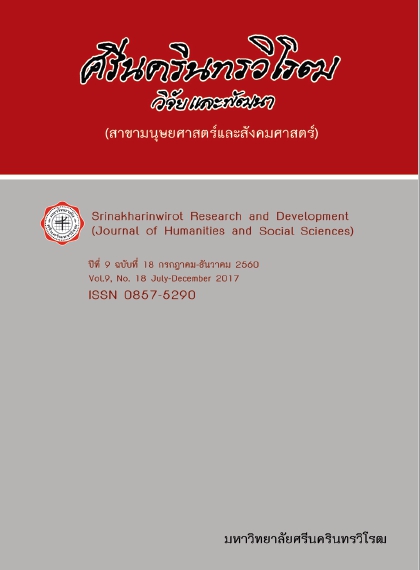การถ่ายทอดทางสังคมกับความผูกพันในงานและองค์กรที่มีต่อพฤติกรรมการทำงาน อย่างมีส่วนร่วมในการปฏิบัติตามแผน ของบุคลากรของมหาวิทยาลัยศรีนครินทรวิโรฒ (WORK SOCIALIZATION AND WORK AND ORGANIZATIONAL ENGAGEMENT RELATED TO PARTICIPATING WORK BEHAVIORAL FALLOW ACT
Abstract
การวิจัยนี้มีวัตถุประสงค์เพื่อ 1) ศึกษาปฏิสัมพันธ์ร่วมระหว่างการถ่ายทอดทางสังคมกับความผูกพันในงานและองค์กรที่มีต่อพฤติกรรมการมีส่วนร่วมในการปฏิบัติตามแผนของบุคลการ มหาวิทยาลัยศรีนครินทรวิโรฒ ทั้งในกลุ่มรวมและกลุ่มที่มีชีวสังคมต่างกัน 2) ศึกษาอิทธิพลของปัจจัยการถ่ายทอดทางสังคมและความผูกพันในงานและองค์กรที่มีต่อพฤติกรรมการมีส่วนร่วมในการปฏิบัติตามแผนของบุคลการ โดยส่งผ่านแรงจูงใจใฝ่สัมฤทธิ์ และ 3) ศึกษาปัจจัยสำคัญที่มีอำนาจในการอธิบายพฤติกรรมการมีส่วนร่วมในการปฏิบัติตามแผนของบุคลการ ทั้งในกลุ่มรวมและกลุ่มที่มีชีวสังคมต่างกัน กลุ่มตัวอย่าง คือ บุคลากรในมหาวิทยาลัย จำนวน 410 คน โดยการสุ่มตัวอย่างแบบชั้นภูมิที่เป็นไปตามสัดส่วนของประชาการ (Proportionated Stratified Random Sampling) เครื่องมือที่ใช้ในการวิจัยครั้งนี้ ประกอบไปด้วย 5 ตอน ได้แก่ ตอนที่ 1 เป็นแบบสอบถามลักษณะทางชีวสังคมของผู้ตอบแบบสอบถาม และตอนที่ 2-5 เป็นแบบสอบถามเกี่ยวกับปัจจัยที่เป็นตัวแปรในการศึกษา สำหรับสถิติที่ใช้ในการศึกษาครั้งนี้ประกอบด้วย สถิติเบื้องต้น และสถิติเพื่อทดสอบสมมติฐาน ได้แก่ ใช้ค่าสถิติที (t-test) สถิติวิเคราะห์ความแปรปรวนทางเดียว (1- way ANOVA) สถิติวิเคราะห์ความแปรปรวนสองทาง (2- way ANOVA) สถิติวิเคราะห์สหสัมพันธ์แบบเพียร์สัน (Pearson Product-Moment Correlation Coefficient) วิเคราะห์อิทธิพลแบบตัวแปรสังเกต (Observed Variable Path Analysis) และสถิติวิเคราะห์การถดถอยพหุคูณ (Multiple Regression Analysis) ผลการวิจัยพบว่า 1) ผลปฏิสัมพันธ์ดังต่อไปนี้ 1.1) การถ่ายทอดทางสังคมจากผู้บริหาร พบผลปฏิสัมพันธ์กับความผูกพันในองค์กรต่อพฤติกรรมการทำงานอย่างมีส่วนร่วมในการปฏิบัติตามแผนด้านการจัดทำแผน อย่างมีนัยสำคัญทางสถิติ ในกลุ่มบุคลากรที่มีระดับการศึกษาปริญญาโท 1.2) การถ่ายทอดทางสังคมจากผู้บริหาร พบผลปฏิสัมพันธ์กับความผูกพันในงานต่อพฤติกรรมการทำงานอย่างมีส่วนร่วมในการปฏิบัติตามแผนด้านการตัดสินใจ อย่างมีนัยสำคัญทางสถิติ ในกลุ่มบุคลากรที่มีระดับการศึกษาปริญญาตรี
และระดับปริญญาโท 1.3) การถ่ายทอดทางสังคมจากผู้บริหาร พบผลปฏิสัมพันธ์กับความผูกพันในงานต่อพฤติกรรมการทำงานอย่างมีส่วนร่วมในการปฏิบัติตามแผนด้านการดำเนินงาน/ปฏิบัติงานตามแผนอย่างมีนัยสำคัญทางสถิติ ในกลุ่มรวมสำหรับถ่ายทอดทางสังคมจากผู้บริหาร พบผลปฏิสัมพันธ์กับความผูกพันในองค์กรทั้งในกลุ่มรวม กลุ่มบุคลากรสายสนับสนุนวิชาการ และกลุ่มบุคลากรที่มีระดับการศึกษาปริญญาเอก ซึ่งการถ่ายทอดทางสังคมจากผู้ร่วมงาน พบผลปฏิสัมพันธ์กับความผูกพันในงานทั้งในกลุ่มรวม และกลุ่มบุคลากรสายสนับสนุนวิชาการ และการถ่ายทอดทางสังคมจากผู้ร่วมงาน พบผลปฏิสัมพันธ์กับความผูกพันในองค์กรทั้งในกลุ่มรวมและกลุ่มบุคลากรสายสนับสนุนวิชาการ 2) สำหรับการถ่ายทอดทางสังคมจากผู้บริหารมีอิทธิพลทางตรงต่อพฤติกรรมการทำงานอย่างมีส่วนร่วมในการปฏิบัติตามแผนทั้ง 3 ด้าน และความผูกพันในงานมีอิทธิพลทางตรงต่อแรงจูงใจใฝ่สัมฤทธิ์ มากกว่าตัวแปรเชิงเหตุอื่นๆ ที่ศึกษา และ 3) การถ่ายทอดทางสังคมจากผู้บริหาร การถ่ายทอดทางสังคมจากผู้ร่วมงาน และความผูกพันในองค์กรเป็นตัวทำนายพฤติกรรมการทำงานอย่างมีส่วนร่วมในการปฏิบัติตามแผนในกลุ่มรวม ได้ร้อยละ 59.50 และการถ่ายทอดทางสังคมจากผู้บริหาร แรงจูงใจใฝ่สัมฤทธิ์ และการถ่ายทอดทางสังคมจากผู้ร่วมงานเป็นตัวทำนายพฤติกรรมการทำงานอย่างมีส่วนร่วมในการปฏิบัติตามแผนด้านการจัดทำแผน ในกลุ่มรวม ได้ร้อยละ 51.90
The influence of Work Socialization and Work and Organizational Engagement on Participating Work Behavioral Follow Action Plan of Employees in Srinakharinwirot University. The influence of Work Socialization, Job Commitment, and Work and Organizational Engagement on Participating Work Behavioral Follow Action Plan of Srinakharinwirot University’s Employees aimed to (1) examine the interaction between work socialization and commitment on participating work behavioral follow action plan of employees in Srinakharinwirot University from entire group of employees and different social status group. (2) Study factors influencing work socialization and Work and Organizational Engagement on participating work behavioral follow action plan of employee mediated by achievement motive (3) Study factor influencing participating work behavioral of employee from entire group of employees and different social status group. The samples are 410 employees in Srinakharinwirot University consists of civil servants and university officers both faculty and support staff using proportionated stratified random sampling. The instruments of this quantitative research consists of 5 questionnaires. The first part of questionnaire is demographic data of respondents and part 2-5 of the questionnaires are about variables in this study. This study uses descriptive statistics as well as t-test, 1 and 2 way ANOVA, Pearson Product-Moment Correlation Coefficient, Observed Variable Path Analysis and Multiple Regression Analysis to analyze the data. The findings indicated as follows: 1) Participating work behavioral follow action plan found no interaction between work socialization and Work and Organizational Engagement on participating work behavioral follow action plan from entire group members and different social status group (Employee Dimensions consist of faculty and support staff. Education dimensions consist of less than Bachelor’s Degree, Bachelor Degree, Master’s Degree, and Doctoral Degree. 2) Participating work behavioral follow action plan from planning dimension. 2.1) There is no interaction between work socialization of leaders and job and 2.2) Commitment on participating work behavioral follow action plan from planning dimension both entire group of employees and different social status group. 3) There is an interaction between work socialization of leaders and organizational commitment on participating work behavioral follow action plan from planning within a group of employees who obtain Master’s Degree (F(.05, 1, 72)=6.85*). 4) Participating work behavioral follow action plan from decision making dimension found no interaction between work socialization of leaders and work and organizational engagement on participating work behavior follow action plan from decision making within a group of employees who obtains Bachelor’s Degree (F.05, 1, 205=4.02*) and Master’s Degree (F.05, 1, 72=4.93*). 5) Participating work behavioral follow action plan from procedures or planning dimensions found an interaction between work socialization of leaders and work and organizational engagement on participating work behavioral follow action plan from procedures and planning within the entire group of employees (F.05, 1, 406=4.05*). 6) There is an interaction between work socialization of leaders and work and organizational engagement on participating work behavioral follow action plan from procedures and planning between the entire employees (F.05, 1, 406=6.74*), support staff (F.05, 1, 99=4.87*) and employees with doctoral degree (F.05, 1,62=4.47*). 7) There is an interaction between work socialization of coworkers and work and organizational engagement on participating work behavioral follow action plan from procedures and planning between the entire group of employees (F.05, 1, 406=9.28*) and support staff (F.05, 1, 303=6.94*). 8) There is an interaction between work socialization of coworkers and work and organizational engagement on participating work behavioral follow action plan from procedures and planning between the entire group of employees (F.05, 1, 406=5.76*) and support staff (F.05, 1, 303=4.23*). And work socialization of executives had a direct effect on 3 dimensions of participating work behavioral follow action plan, work and organizational engagement had a direct effect on achievement motive more than other variables, 3) Work socialization of executives, work socialization of coworkers, and work and organizational engagement were the predictors of participating work behavioral follow action plan within the whole group at 59.50 percent, work socialization of executives, achievement motive, and work socialization of coworkers were the predictors of participating work behavioral follow action plan within the whole group at 51.90 percent.
Downloads
References
สืบค้นเมื่อ 29 สิงหาคม 2555, จาก http://www.ops.moe.go.th/home/index.php?option=com_ content&view=article&id=1208:2012-08-09-06-38-04&catid=34:2012-04-27-04-51-31&Itemid=69
[2] มหาวิทยาลัยศรีนครินทรวิโรฒ. (2555, สิงหาคม). ประวัติมหาวิทยาลัยศรีนครินทรวิโรฒ. สืบค้นเมื่อ 29 สิงหาคม 2555, จาก http://swu.ac.th/history.php
[3] สมเกียรติ วัฒนศิริชัยกุล. (2553, สิงหาคม). แผนยุทธศาสตร์ชาติเพื่อพัฒนาประเทศไทยก่อนเข้าสู่ประชาคมเศรษฐกิจอาเซียนในปี ค.ศ. 2015. สืบค้นเมื่อ 29 สิงหาคม 2555, จาก http://elib3.ect. go.th/Multim/Aped/ Aped01_62.pdf
[4] Magnusson, D.; & Endler, N.S. (1977). Personallity at the Crossroads: Current Issues in Interactionism
Psychology. NewJersey: LEA Publishers: 18-21.
[5] ดวงเดือน พันธุมนาวิน; และคนอื่นๆ. (2543). ทฤษฎีต้นไม้จริยธรรม: การวิจัยและการพัฒนาบุคคล. พิมพ์ครั้งที่ 2.
กรุงเทพฯ: สำนักพิมพ์จุฬาลงกรณ์มหาวิทยาลัย.
[6] ลักษมี ลุประสงค์. (2546). ปัจจัยทางจิตสังคมและลักษณะทางพุทธที่เกี่ยวข้องกับพฤติกรรมการทำงานด้านการ
สื่อสารตามมาตรฐานสากลของประเทศไทย ด้านการจัดการและสัมฤทธิ์ผลของงานภาครัฐ (P.S.O1102:
ระบบการสื่อสาร) ของบุคลากรทางการศึกษา กระทรวงศึกษาธิการ. ปริญญานิพนธ์ วท.ม. (การวิจัย
พฤติกรรมศาสตร์ประยุกต์). กรุงเทพฯ: บัณฑิตวิทยาลัย มหาวิทยาลัยศรีนครินทรวิโรฒ ประสานมิตร.
[7] จรัล อุ่นฐิติวัฒน์. (2548). กลวิธีการถ่ายทอดทางสังคมขององค์การที่ส่งผลต่อความพึงพอใจในงานและความผูกพันในองค์การสำหรับพนักงานสถาบันการเงินพิเศษของรัฐ. ปริญญาวิทยาศาสตรดุษฎีบัณฑิต (การวิจัยพฤติกรรมศาสตร์ประยุกต์). กรุงเทพฯ: บัณฑิตวิทยาลัย มหาวิทยาลัยศรีนครินทรวิโรฒ
[8]บัณฑิต ผังนิรันดร์. (2550). อิทธิพลของลักษณะองค์การ นโยบายการบริหาร และการปฏิบัติงาน สภาพแวดล้อมการทำงานภายในองค์การ แรงจูงใจในการทำงาน ความพึงพอใจในงาน และความผูกพันต่อองค์การที่มีต่อประสิทธิภาพของมหาวิทยาลัยราชภัฎสวนสุนันทา. ปริญญาการศึกษาดุษฎีบัณฑิต (การอุดมศึกษา). กรุงเทพฯ: บัณฑิตวิทยาลัย มหาวิทยาลัยศรีนครินทรวิโรฒ
[9] ศิริวรรณ เสรีรัตน์; และคณะ. (2541). พฤติกรรมองค์การ. กรุงเทพฯ: บริษัทธีระฟิล์มและไซเท็กซ์จำกัด.
[10] วารุณี คำแก้ว. (2550). ความผูกพันต่อองค์กรของพนักงาน ธนาคารไทยธนาคาร จำกัด (มหาชน) สำนักงานใหญ่. บริหารธุรกิจมหาบัณฑิต (การจัดการทั่วไป). มหาวิทยาลัยราชภัฎพระนคร.
[11] อังศินันท์ อินทรกำแหง. (2548). เอกสารประกอบการสอน รายวิชา วป 722 ผู้นำ สมาชิกและการพัฒนาองค์การ.สถาบันวิจัยพฤติกรรมศาสตร์ประยุกต์ มหาวิทยาลัยศรีนครินทรวิโรฒ.
[12] ตุลา มหาสุธานนท์. ( 2547, ตุลาคม ). ความหมายของแรงจูงใจ. สืบค้นเมื่อ 12 ตุลาคม 2555, จากhttp://www.learners.in.th/blogs/posts/281180
Downloads
Published
How to Cite
Issue
Section
License
Srinakharinwirot Research and Development Journal of Humanities and Social Sciences is licensed Under a Creative Commons Attribution-NonCommercial-NoDerivs 4.0 International (CC-BY-NC-ND 4.0) License, Unless Otherwise Stated. Please Read Journal Policies Page for More Information on Open Access, Copyright and Permissions.


